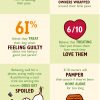
Millions of dog owners worry they are feeding their pets the wrong kind of treats.
A study of 2,000 dog devotees found the average family hound will consume 27 treats a week, but six in 10 fear they aren’t good for their beloved pooch.
Behaving well for a photograph, acting ‘cute’ and performing a trick are among the reasons dogs get spoilt.
But three in 10 owners will also pamper their pooch if they’ve been home alone for too long while 16 per cent have fallen for the puppy dog eyes and given in when their pet begs.
More than six in 10 even admitted to giving their dog a treat or two when feeling guilty about not being a good ‘pet parent’.
Henrietta Morrison from Lily’s Kitchen, which commissioned the study, said: “We’re a nation of dog lovers and we believe our four-legged friends are an integral part of our family.
“So much so that we love to treat them just as much as our two-legged family members.
“In fact, nine in 10 owners admit getting real joy from treating their pets.
“Our pets treat us by giving us unconditional love, laughs and cuddles, so it only seems right that we want to spoil them whenever we can.
“The act of treating brings you closer together with your dog and helps you form a stronger bond with them, whether you’re giving them a treat for training or treating them just because.
“And there is nothing wrong with treating a pet often, as long as you’re doing it with healthy and nutritious, proper treats.”
But the study also found that it’s not just dog treats getting scoffed by the handful – ice cream, bacon and cheese are among the unhealthy ‘human foods’ used as dog treats.
And although half of pups prefer dog treats over other options, one in 10 owners admitted to serving up grapes and chocolate to their pampered pets – despite them being highly toxic to dogs.
As a result, three quarters have had to take their dog to the vet because they got poorly after eating something they shouldn’t have.
Another 38 per cent regret treating their pet too much.
In fact, one quarter have been advised by their vet to change their feeding habits for the sake of their dog’s health.
Other than becoming unwell, feeding a pet the wrong thing or too much can also cause problems for their weight and overall health.
More than half of the nation’s dog lovers worry about their furry friend’s weight and seven in 10 have limited their snacks when they’ve started to get too heavy.
But six in 10 believe treating their pet shows them how much they love them.
It also emerged that while more than a third know to look at the back of food packets, research online or talk to their vet for nutritional information, one fifth don’t know what their dog should or shouldn’t be eating.
And two thirds of the pet lovers polled, via OnePoll, worry about the quality of ingredients in store-bought dog treats.
Henrietta Morrison from Lily’s Kitchen, maker of proper food for pets with natural ingredients like fresh meat and wholesome fruits and vegetables, added: “As we have so much love for our four-legged family members, we obviously want to treat them, but it’s important that we treat them in the right way so they can live happy and healthy lives.
“And there are so many wonderful guilt-free ways to treat your pets.
“Just like looking after our own health is important, we’re responsible for our pet’s health too.
“Feeding your dog the wrong things can cause a number of health problems for them, and the signs that they’re struggling may not be obvious.
“The best way to ensure your four-legged friend stays fit and healthy is to feed them proper treats and complete meals made with fresh ingredients that give them a well-rounded, balanced diet.”
jQuery(document).ready(function($) {
// We only want these styles applied when javascript is enabled
$(‘.gal_content’).css(‘display’, ‘block’);
// Initialize Advanced Galleriffic Gallery
var gallery = $(‘#thumbs_35473_1’).galleriffic({
delay: 3500,
numThumbs: 12,
preloadAhead: 12,
enableTopPager: false,
enableBottomPager: false,
imageContainerSel: ‘#slideshow_35473_1’,
controlsContainerSel: ‘#controls_35473_1’,
captionContainerSel: ‘#caption_35473_1’,
loadingContainerSel: ‘#loading_35473_1’,
renderSSControls: true,
renderNavControls: false,
playLinkText: ‘Play Slideshow’,
pauseLinkText: ‘Pause Slideshow’,
enableHistory: 0,
autoStart: 0,
enableKeyboardNavigation: true,
syncTransitions: false,
defaultTransitionDuration: 300,
onTransitionOut: function(slide, caption, isSync, callback) {
slide.fadeTo(this.getDefaultTransitionDuration(isSync), 0.0, callback);
caption.fadeTo(this.getDefaultTransitionDuration(isSync), 0.0);
},
onTransitionIn: function(slide, caption, isSync) {
var duration = this.getDefaultTransitionDuration(isSync);
slide.fadeTo(duration, 1.0);
// Position the caption at the bottom of the image and set its opacity
var slideImage = slide.find(‘img’);
caption.fadeTo(duration, 1.0);
},
onPageTransitionOut: function(callback) {
//this.hide();
setTimeout(callback, 100); // wait a bit
},
onPageTransitionIn: function() {
var prevPageLink = this.find(‘a.prev’).css({‘opacity’: ‘0.3’ , ‘display’ : ‘inline-block’, ‘cursor’ : ‘default’});
var nextPageLink = this.find(‘a.next’).css({‘opacity’: ‘0.3’ , ‘display’ : ‘inline-block’, ‘cursor’ : ‘default’});
// Show appropriate next / prev page links
if (this.displayedPage > 0)
prevPageLink.css({‘opacity’ : ‘1’ , ‘display’ : ‘inline-block’, ‘cursor’ : ‘pointer’});
var lastPage = this.getNumPages() – 1;
if (this.displayedPage < lastPage)
nextPageLink.css({'opacity' : '1' , 'display' : 'inline-block', 'cursor' : 'pointer'});
this.fadeTo('fast', 1.0);
}
});
/**************** Event handlers for custom next / prev page links **********************/
gallery.find('a.prev').click(function(e) {
gallery.previousPage();
e.preventDefault();
});
gallery.find('a.next').click(function(e) {
gallery.nextPage();
e.preventDefault();
});
});
ENDS






















